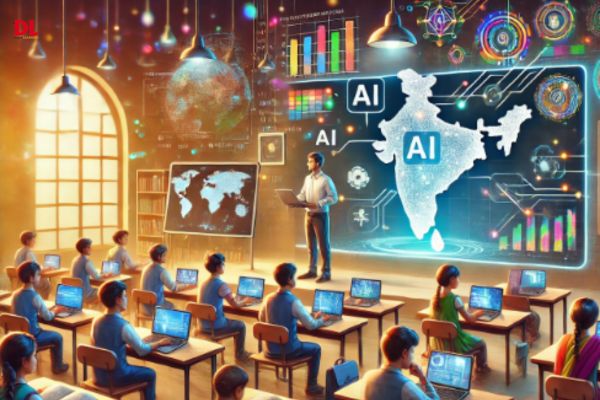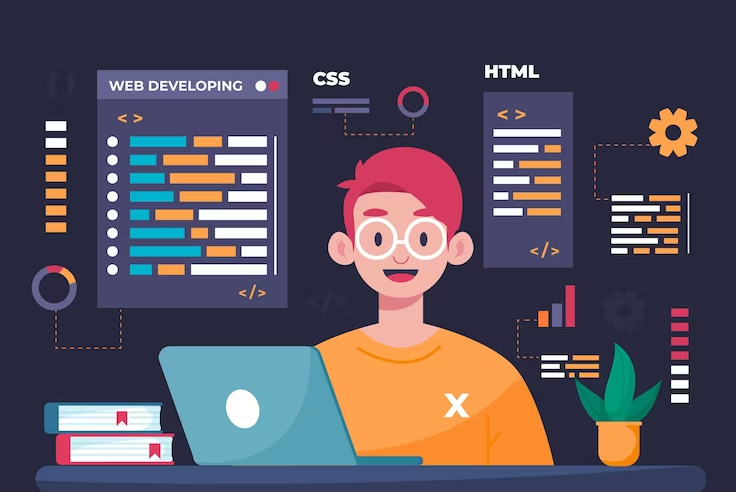AI in Indian Classrooms
Posted On July 11, 2025

In the ever-evolving landscape of education, Artificial Intelligence (AI) is no longer just a futuristic concept-it is a current, tangible force revolutionizing how students learn, teachers teach, and institutions operate. In India, the integration of AI into classrooms has gained substantial momentum, especially after the formulation of National Education Policy (NEP) 2020 and the launch of initiatives like Digital India 2.0, NDEAR (National Digital Education Architecture), and PM eVidya. As we move through 2025, AI’s influence in Indian classrooms is not only visible-it is transforming the core pedagogy, personalization, and accessibility of education.
1. The Rise of AI in Indian Education
India's education sector, one of the largest in the world, has traditionally struggled with issues of access, quality, and equity. The emergence of AI presents an opportunity to bridge these gaps. From adaptive learning systems that tailor instruction to a student's pace and skill level, to AI chatbots that act as 24/7 tutors, AI is reshaping the way knowledge is imparted. The government’s push to integrate AI was first officially seen in NEP 2020, which emphasizes the use of technology-enhanced learning and data-driven governance. Organizations like CBSE, NCERT, and NITI Aayog have since partnered with edtech startups and global AI firms to initiate AI-based projects across public and private schools.
2. Personalized Learning Through AI
One of the most notable applications of AI in classrooms is personalized learning. Unlike traditional teaching methods where one teacher instructs an entire class, AI platforms use data analytics to tailor content to individual student needs. Apps like Byju's, Toppr, and Vedantu have developed AI-backed learning paths that adjust difficulty based on student responses. These platforms track student progress in real-time, identify learning gaps, and provide targeted practice.
Even government platforms are adopting this model. The DIKSHA+ platform, launched in 2024, includes an AI-powered recommendation engine that suggests lesson plans, assessments, and remedial content based on past student performance. This personalization is particularly useful in inclusive education. AI tools are now being used to support students with learning disabilities, providing voice recognition, text-to-speech, and visual learning aids.
3. AI-Assisted Teaching Tools for Educators
Teachers, often overwhelmed with large class sizes and administrative responsibilities, are finding relief in AI-based classroom management tools. Platforms like Teachmint AI, Google Classroom AI Add-ons, and EduGyaan provide teachers with analytics dashboards that show student engagement, attendance, performance trends, and suggested interventions. AI tools help automate repetitive tasks such as grading assignments, creating question papers, or generating lesson summaries. For instance, CBSE’s pilot program in Delhi government schools uses an AI tool that evaluates short-aNSEer questions by comparing them with model responses.
Moreover, lesson-planning AI assistants help teachers align their content with NEP's competency-based learning outcomes, suggesting multimedia resources, in-class activities, and assessments automatically.
4. AI-Driven Assessments and Examinations
Examinations are evolving with AI, shifting from static pen-and-paper tests to dynamic, competency-based assessments. Adaptive testing engines analyze a student's performance in real-time and modify the difficulty level of the next question accordingly. EdTech companies like Embibe and Next Education offer AI exam platforms that track not just what students aNSEer, but how they approach questions-timing, hesitation, and confidence indicators are all part of the AI’s evaluation process.
The CBSE AI-Based Assessment Platform, launched in 2023, allows students to take mock tests with real-time scoring, personalized feedback, and suggested revision areas. These tools are being integrated with government e-learning platforms and are expected to become mainstream in board exam preparation by 2026.
5. Regional Language Integration and Inclusivity
India’s linguistic diversity often creates a digital divide. AI is helping bridge this through Natural Language Processing (NLP) models trained on Indian languages. Platforms like Bhashini, a government-supported AI language initiative, are developing AI translation models in over 20 Indian languages. This makes AI-based learning tools accessible to students in rural Bihar, tribal Odisha, or northeastern states where English is not the primary medium of instruction. AI chatbots, voice-based assistants, and reading tools now understand and respond in regional dialects, ensuring linguistic inclusivity.
6. AI Labs in Schools- Preparing the Future Workforce
In alignment with NEP 2020's vision to prepare students for the future of work, AI has been introduced as a subject in many CBSE and ICSE schools. Over 30,000 schools have established AI labs, often funded through CSR initiatives or under the Atal Innovation Mission. Students are now learning the basics of machine learning, data science, and robotics as part of their curriculum. Coding platforms like Scratch, Blockly, and Python-based AI modules are taught from middle school onwards.
In partnership with Intel, IBM, and Microsoft, schools also conduct AI Bootcamps, hackathons, and virtual internships, helping students explore practical applications of AI in healthcare, agriculture, and civic tech.
7. Equity and Challenges in Implementation
Despite rapid advancements, the spread of AI in Indian classrooms is uneven. Urban private schools have embraced it quickly, while rural and government schools face barriers like-
Poor internet connectivity
Lack of smart devices
Inadequate teacher training
Low digital literacy among parents
To address these issues, the government is investing in Digital Infrastructure Upgradation Grants, subsidizing tablets for underprivileged students, and offering online AI certification for teachers. Moreover, public-private partnerships are being encouraged under NDEAR, allowing startups to pilot AI tools in low-resource settings and collect impact data.
8. Ethical Concerns and Regulation
AI in education also brings ethical concerns. Data privacy, algorithmic bias, over-dependence on automation, and student surveillance are major issues. Experts argue that poorly designed AI systems can exacerbate existing inequities, penalizing students from marginalized backgrounds.
In response, the Ministry of Education, in consultation with MeitY and NITI Aayog, is working on a “National AI in Education Framework”, which will define-
Guidelines for responsible AI use
Data protection norms
Student consent and parental control
Bias testing and algorithmic fairness
These regulations are expected to be released by the end of 2025 and will be mandatory for all AI tools used in K-12 education.
9. The Road Ahead- Blended and AI-Augmented Learning
The future of education in India is likely to be blended-a mix of human instruction and AI augmentation. Teachers will remain central, but supported by AI that enhances their reach, efficiency, and precision. Government and private stakeholders are also exploring AI tutors in rural settings, where teacher-student ratios are poor. Pilot programs in Madhya Pradesh and Uttar Pradesh have shown promising outcomes in remote areas with offline AI kits that sync content when connected to the internet.
AI is also being used to predict dropouts, monitor emotional well-being, and track attendance using facial recognition. While controversial, these tools are being tested cautiously, with a strong push for parental involvement.
10. Conclusion
AI in Indian classrooms is not a passing trend-it is a fundamental evolution in how we conceptualize and deliver education. From personalization and multilingual inclusivity to advanced analytics and smart assessments, AI is reimagining the classroom experience. India’s challenge now is to scale this revolution equitably, ethically, and sustainably. With strong policy support, innovation from startups, and dedicated efforts from educators, India has the potential to become a global leader in AI-powered education. The success of this movement will not be defined by how advanced the tools are, but by how human-centric, accessible, and inclusive the learning experience becomes.
1. The Rise of AI in Indian Education
India's education sector, one of the largest in the world, has traditionally struggled with issues of access, quality, and equity. The emergence of AI presents an opportunity to bridge these gaps. From adaptive learning systems that tailor instruction to a student's pace and skill level, to AI chatbots that act as 24/7 tutors, AI is reshaping the way knowledge is imparted. The government’s push to integrate AI was first officially seen in NEP 2020, which emphasizes the use of technology-enhanced learning and data-driven governance. Organizations like CBSE, NCERT, and NITI Aayog have since partnered with edtech startups and global AI firms to initiate AI-based projects across public and private schools.
2. Personalized Learning Through AI
One of the most notable applications of AI in classrooms is personalized learning. Unlike traditional teaching methods where one teacher instructs an entire class, AI platforms use data analytics to tailor content to individual student needs. Apps like Byju's, Toppr, and Vedantu have developed AI-backed learning paths that adjust difficulty based on student responses. These platforms track student progress in real-time, identify learning gaps, and provide targeted practice.
Even government platforms are adopting this model. The DIKSHA+ platform, launched in 2024, includes an AI-powered recommendation engine that suggests lesson plans, assessments, and remedial content based on past student performance. This personalization is particularly useful in inclusive education. AI tools are now being used to support students with learning disabilities, providing voice recognition, text-to-speech, and visual learning aids.
3. AI-Assisted Teaching Tools for Educators
Teachers, often overwhelmed with large class sizes and administrative responsibilities, are finding relief in AI-based classroom management tools. Platforms like Teachmint AI, Google Classroom AI Add-ons, and EduGyaan provide teachers with analytics dashboards that show student engagement, attendance, performance trends, and suggested interventions. AI tools help automate repetitive tasks such as grading assignments, creating question papers, or generating lesson summaries. For instance, CBSE’s pilot program in Delhi government schools uses an AI tool that evaluates short-aNSEer questions by comparing them with model responses.
Moreover, lesson-planning AI assistants help teachers align their content with NEP's competency-based learning outcomes, suggesting multimedia resources, in-class activities, and assessments automatically.
4. AI-Driven Assessments and Examinations
Examinations are evolving with AI, shifting from static pen-and-paper tests to dynamic, competency-based assessments. Adaptive testing engines analyze a student's performance in real-time and modify the difficulty level of the next question accordingly. EdTech companies like Embibe and Next Education offer AI exam platforms that track not just what students aNSEer, but how they approach questions-timing, hesitation, and confidence indicators are all part of the AI’s evaluation process.
The CBSE AI-Based Assessment Platform, launched in 2023, allows students to take mock tests with real-time scoring, personalized feedback, and suggested revision areas. These tools are being integrated with government e-learning platforms and are expected to become mainstream in board exam preparation by 2026.
5. Regional Language Integration and Inclusivity
India’s linguistic diversity often creates a digital divide. AI is helping bridge this through Natural Language Processing (NLP) models trained on Indian languages. Platforms like Bhashini, a government-supported AI language initiative, are developing AI translation models in over 20 Indian languages. This makes AI-based learning tools accessible to students in rural Bihar, tribal Odisha, or northeastern states where English is not the primary medium of instruction. AI chatbots, voice-based assistants, and reading tools now understand and respond in regional dialects, ensuring linguistic inclusivity.
6. AI Labs in Schools- Preparing the Future Workforce
In alignment with NEP 2020's vision to prepare students for the future of work, AI has been introduced as a subject in many CBSE and ICSE schools. Over 30,000 schools have established AI labs, often funded through CSR initiatives or under the Atal Innovation Mission. Students are now learning the basics of machine learning, data science, and robotics as part of their curriculum. Coding platforms like Scratch, Blockly, and Python-based AI modules are taught from middle school onwards.
In partnership with Intel, IBM, and Microsoft, schools also conduct AI Bootcamps, hackathons, and virtual internships, helping students explore practical applications of AI in healthcare, agriculture, and civic tech.
7. Equity and Challenges in Implementation
Despite rapid advancements, the spread of AI in Indian classrooms is uneven. Urban private schools have embraced it quickly, while rural and government schools face barriers like-
Poor internet connectivity
Lack of smart devices
Inadequate teacher training
Low digital literacy among parents
To address these issues, the government is investing in Digital Infrastructure Upgradation Grants, subsidizing tablets for underprivileged students, and offering online AI certification for teachers. Moreover, public-private partnerships are being encouraged under NDEAR, allowing startups to pilot AI tools in low-resource settings and collect impact data.
8. Ethical Concerns and Regulation
AI in education also brings ethical concerns. Data privacy, algorithmic bias, over-dependence on automation, and student surveillance are major issues. Experts argue that poorly designed AI systems can exacerbate existing inequities, penalizing students from marginalized backgrounds.
In response, the Ministry of Education, in consultation with MeitY and NITI Aayog, is working on a “National AI in Education Framework”, which will define-
Guidelines for responsible AI use
Data protection norms
Student consent and parental control
Bias testing and algorithmic fairness
These regulations are expected to be released by the end of 2025 and will be mandatory for all AI tools used in K-12 education.
9. The Road Ahead- Blended and AI-Augmented Learning
The future of education in India is likely to be blended-a mix of human instruction and AI augmentation. Teachers will remain central, but supported by AI that enhances their reach, efficiency, and precision. Government and private stakeholders are also exploring AI tutors in rural settings, where teacher-student ratios are poor. Pilot programs in Madhya Pradesh and Uttar Pradesh have shown promising outcomes in remote areas with offline AI kits that sync content when connected to the internet.
AI is also being used to predict dropouts, monitor emotional well-being, and track attendance using facial recognition. While controversial, these tools are being tested cautiously, with a strong push for parental involvement.
10. Conclusion
AI in Indian classrooms is not a passing trend-it is a fundamental evolution in how we conceptualize and deliver education. From personalization and multilingual inclusivity to advanced analytics and smart assessments, AI is reimagining the classroom experience. India’s challenge now is to scale this revolution equitably, ethically, and sustainably. With strong policy support, innovation from startups, and dedicated efforts from educators, India has the potential to become a global leader in AI-powered education. The success of this movement will not be defined by how advanced the tools are, but by how human-centric, accessible, and inclusive the learning experience becomes.










